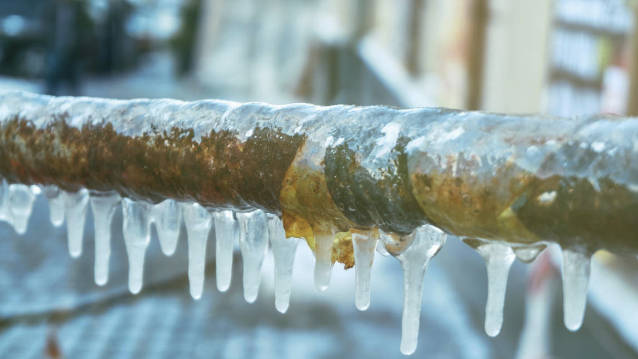‘Tis the Season — to Protect Your Pipes from Freezing!

The cold snap at the end of last year found many people scrambling to protect their most important investment: their home. While the weather has warmed up this week, it’s likely we’ll see more cold weather before this winter comes to an end. Extreme weather conditions could still harm your pipes, but there are several preventative steps you can take to keep your pipes from freezing.
Here are a few simple tips before our next cold snap:
- A trickle of hot and cold water might be all it takes to keep your pipes from freezing. Let warm water drip overnight, preferably from a faucet on an outside wall.
- Keep your thermostat set at the same temperature during both day and night. You might be in the habit of turning down the heat when you’re asleep, but further drops in the temperature – more common overnight – could catch you off guard and freeze your pipes.
- Disconnect garden hoses and, if possible, use an indoor valve to shut off and drain water from pipes leading to outside faucets. This reduces the chance of freezing in the short span of pipe just inside the house. Covering any outside faucets will also be helpful.
- Open cabinet doors to allow heat to get to un-insulated pipes under sinks and appliances near exterior walls.
Traveling in the winter months might be good for the soul, but don’t forget to think about your pipes before you leave. What can you do?
- Set the thermostat in your house no lower than 55°F (12°C).
- Ask a friend or neighbor to check your house daily to make sure it’s warm enough to prevent freezing.
- Shut off and drain the water system. Be aware that if you have a fire protection sprinkler system in your house, it may be deactivated when you shut off the water.
What do you do if your pipes still freeze, despite your best preventative measures? First step: Don’t panic. Just because they’re frozen doesn’t mean they’ve already burst. Here’s what you can do:
- If you turn on your faucets and nothing comes out, leave the faucets turned on and call a plumber.
- Do not use electrical appliances in areas of standing water: You could be electrocuted.
- Never try to thaw a pipe with a torch or other open flame because it could cause a fire hazard. Water damage is preferable to burning down your house!
- You may be able to thaw a frozen pipe with the warm air from a hair dryer. Start by warming the pipe as close to the faucet as possible, working toward the coldest section of the pipe.
- If your water pipes have already burst, turn off the water at the main shutoff valve in the house; leave the water faucets turned on. Make sure everyone in your family knows where the water shutoff valve is and how to open and close it.
The above tips and more can be found at: http://learningcenter.statefarm.com/residence/maintenance/preventing-frozen-pipes.





